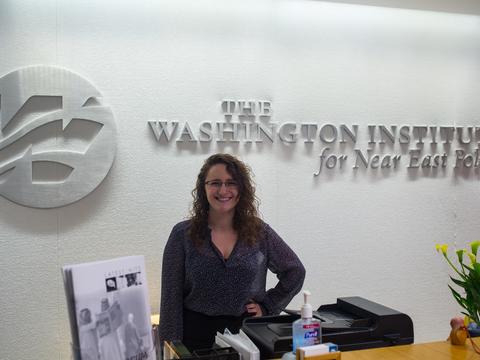
Middle Eastern and Islamic Studies Concentration
Haverford's concentration in Middle Eastern and Islamic Studies (MEIS) offers students the opportunity to study the Middle East and broader Muslim world in conjunction with a complementary major. Our interdisciplinary concentration draws on faculty and courses from the departments of anthropology, art history, history, political science, religion, and sociology. Students pursue a rich program that enables them to explore—using discipline-specific tools—the many dimensions of the Middle Eastern and Islamic worlds as well as focus on a particular area of interest related to their major.
Through our committed faculty, rich co-curricular programming, and various study abroad opportunities, we aim to cultivate in each of our students an understanding of the Middle Eastern and Muslim worlds that is both deep and relevant. Our students emerge from our program prepared to participate constructively in the debates that frame public discourse about Muslims and the Middle East today.
Curriculum & Courses
We require all concentrators to meet our language requirement: proficiency above the intermediate level in a language related to their area of research. Students get broad exposure to the Middle East’s history and politics and to Islam as a major world religion and social and political force through our core courses (two are required, selected from eight options). They also pursue their own specific interests within MEIS through our wide-ranging electives (four are required), which are based in our allied departments. In addition, all concentrators write a thesis in their major department that addresses Middle Eastern and Islamic Studies.
-
Concentration Requirements
The MEIS concentration is normally available to students majoring in anthropology, history, political science, religion, or comparative literature. Courses from their major must represent at least two but no more than three of the requirements detailed below. Proposals to concentrate on the basis of other majors must be approved in advance by concentration coordinator.
Language Competence
Students must demonstrate competence above the basic level in a language pertinent to their area of research:
- In cases where a student has selected Arabic as their relevant language, this means completion of ARAB H002/ARAB S002.
- If a student is doing research for which another language is more appropriate, they may need to study at the University of Pennsylvania (Pashtu, Persian, Turkish and Swahili) or Bryn Mawr (Hebrew), or take other Haverford language classes (e.g., Chinese, French).
Some study abroad programs are also suitable for gaining language competence. Students should consult with the concentration coordinator about the course of language study to fill this requirement.
Core Courses
Students must take two of the core courses listed below, in which they learn about the Middle East and Islam. Students must choose from two of the four departments listed (e.g., history and political science, anthropology and religion, political science and religion). Students should consult the concentration coordinator to ensure they fill this requirement.
By completing this core requirement, students gain broad exposure to the history and politics of the Middle East, and to Islam as a major world religion and social and political force that began in, and continues to be affected by, the Middle East.
The core course options are:
Course List Code Title Credits Anthropology ANTH H253 1.0 ANTH H259 Ethnography of Islam 1.0 History HIST H117 1.0 Political Science POLS H256 The Evolution of the Jihadi Movement 1.0 POLS H357 International Relations Theory: Conflict and the Middle East 1.0 Religion RELG H106 Introduction to Islam 1.00 RELG H107 1.00 RELG H259 1.00 Elective Courses
Students should pursue areas of inquiry related to the Middle East and/or Islam and specific to their interests by taking four electives, at least one of which is at the 300 level. Examples might include anthropological approaches to the study of Islam or Middle East, Middle Eastern Nationalism, Islam in African politics, Israeli politics, evolution of the Jihadi movement, modern Arabic literature, etc.
To fulfill their elective credit, students may select from a list of designated electives at Bryn Mawr and Swarthmore, or request approval from the concentration coordinator to take other appropriate courses at Bryn Mawr, Swarthmore, or the University of Pennsylvania’s Near Eastern Languages and Civilizations Program. Students may also petition the concentration coordinator and MEIS faculty for approval of a course that is not on the electives list but which the student feels provides important content for their specific research topic.
See the end of this section of the Catalog for a sampling of courses that count toward the MEIS concentration. For more information about core and elective courses, contact the concentration coordinator.
No more than four of the six concentration credits may come from institutions outside of the Tri-Co.
Senior Thesis
Students must write a thesis in their major department (anthropology, history, political science, or religion) that addresses Middle Eastern and Islamic Studies and that the concentration coordinator (as well as the major advisor) approves. The concentration coordinator must approve this thesis topic in advance to count for the MEIS concentration. To request approval, students should submit a brief (one page) thesis proposal to the concentration coordinator and arrange a meeting to discuss the proposal.
Research & Outreach
Concentrators produce a senior thesis, a work of original research. The topic of this capstone work must be approved by both the department in which the student is majoring and by the coordinator of the MEIS Concentration. Thesis advising—one-on-one with a faculty advisor as well as in a group setting—and the timetable for producing the thesis are determined by the policies of the department in which the student’s major is based.

The political science major is pushing for justice for medical facilities harmed in the Syrian conflict as an intern at Physicians for Human Rights.
Blitz hopes to land a position in the business sector, specifically in consulting and management training.

The political science major took a cue from her Middle Eastern and Islamic Studies concentration and her Chinese minor for her thesis on China’s Arab Spring intervention policies.
After Graduation

The religion and history double major is one of only two recipients of the competitive scholarship for study in the U.K., which he will use to pursue a master’s in religion at the University of Oxford.

At the Washington Institute for Near East Policy, the political science major will gain experience in fields of international security, foreign policy, and counterterrorism.
Keep Exploring
More Programs
Check out our other academic offerings:
Get in Touch
Join the Mailing List or search for events in your area.
You can find detailed instructions and information on the Application Instructions page. If you need to contact us directly, please send an email to admission@haverford.edu.
Get Social with Haverford